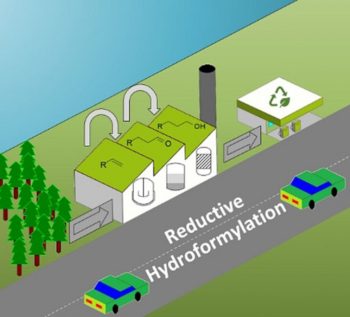Written by Sebastian Püschel, Sven Störtte, Johanna Topphoff, Andreas J. Vorholt, Walter Leitner
Abstract
CO2 neutral fuels are a way to cleaner and more sustainable mobility. Utilization of bio-syngas via Fischer-Tropsch (FT) synthesis represents an interesting route for the production of tailormade biofuels. Recent developments in FT catalyst research led to olefin-enriched products, enabling the synthesis of alcohol-enriched fuels by reductive hydroformylation of the C=C double bond. Several alcohols have already proven to be suitable fuel additives with favorable combustion behavior. We investigated a hydroformylation-hydrogenation sequence of FT-olefin-paraffin mixtures as a potential route to alcohols. A liquid-liquid biphasic system with a rhodium/TPPTS catalyst system was chosen for effective catalyst recycling. After optimizing reaction conditions with a model substrate consisting of 1‑octene and n ‑heptane the conversion of an actual olefin-containing C 5 ‑C 10 FT product fraction to alcohols in continuously operated processes for 37 hours has been achieved with total Turnover number of 23,679.
DOI: https://doi.org/10.1002/cssc.202100929






